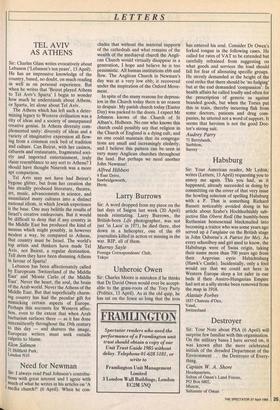LETTERS TEL AVIV AS ATHENS
Sir: Charles Glass writes evocatively about Lebanon (`Lebanon's ten years', 13 April). He has an impressive knowledge of the country, based, no doubt, on much reading as well as on personal experience. But when he writes that 'Beirut played Athens to Tel Aviv's Sparta' I begin to wonder how much he understands about Athens, or Sparta, let alone about Tel Aviv.
The Athens which has left such a deter- mining legacy to Western civilisation was a city of ideas and a society of unsurpassed creative genius. In Athens diversity com- plemented unity: diversity of ideas and a variety of imaginative expression all flow- ing from a common rock bed of tradition and culture. Can Beirut, with her casinos, cabarets and restaurants, fragmented soci- ety and imported entertainment, truly claim resemblance to any sort to Athens? I should have thought Nineveh was a more apt comparison.
Tel Aviv may not have had Beirut's bygone glitter, but from her creation she
has steadily produced literature, theatre,
art, music, advancements in science, and assimilated many cultures into a distinct national idiom, in which Jewish experience is the base. One may belittle the results of Israel's creative endeavours. But it would be difficult to deny that if any country in the Middle East has produced the kind of animus which might possibly, in however modest a way, be compared to Athens, that country must be Israel. The world's top artists and thinkers have made Tel
Aviv, not Beirut, a regular destination. Tell them they have been shunning Athens In favour of Sparta!
Lebanon has been affectionately called by Europeans 'Switzerland of the Middle East' and 'Monte Carlo of the Middle
East'. Never the heart, the soul, the brain of the Arab world. Never the Athens of the
Middle East. But that superficially charm- ing country has had the peculiar gift for mimicking certain aspects of Europe. Perhaps this accounts for Western affec- tion, even to the extent that when Arab barbarism surfaces there — as it has done Intermittently throughout the 19th century to this day — and shatters the image, European writers must seek outside culprits to blame.
Eton Salmon
21 Hillfield Park, London N10


















































 Previous page
Previous page